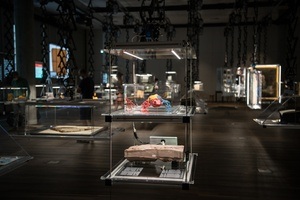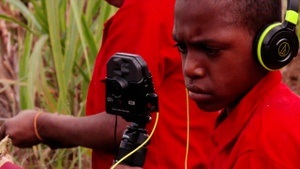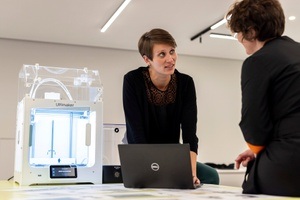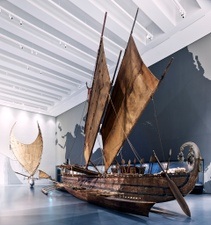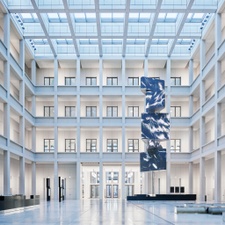99 Questions Gathering: Über die Poetik der losen Enden
In the organizer's words:
Welcome to the 99 Questions Gathering - an event that defies confinement to a single theme and instead celebrates the diversity of voices and perspectives. During the 99 Questions Gathering, two independent yet connected projects that have been the focus of 99 Questions over the past two years will be presented: Textiles Semillas: a vibrant project of weaving and bridge-building and South-to-South: an exchange on African and Afro-diasporic technologies.
Curatorial approach and nodes
At the center of our curatorial work are what we call "nodes", moments of activation and encounter in which threads are picked up and linked, memories are revived, or knots are deliberately untied. Similar to knots that can be untied and retied, knowledge is in constant flux; it can unfold or reassemble, beliefs can change and fresh knowledge can consolidate. This understanding of knowledge is inspired by nodes (connection points) in network systems (such as information and communication networks): the more nodes (or "network nodes") there are, the more stable the network is.
Postextractivism and pluriverse
In the context of 99 questions, the nodes (to be understood here as research nodes) represent the commitment to sustainable and long-term cooperation that focuses on collective knowledge exchange and shared learning. Locally specific questions are discussed jointly by local and international participants on the ground, revealing possible connections and parallels. By jointly acknowledging and engaging with the plurality and complexity of situated knowledge in these in-situ debates, we counteract a universalistic notion of knowledge. It is essential for our practice to act in the sense of an anti-extractivist approach, to practice a kind of cooperation that responds to the different needs of all participants and partners, and to explore possible forms of collaboration.
Research Nodes "South-to-South" and "Textiles Semillas"
The Gathering is an invitation to engage with the nodes that have already formed, to weave common knowledge structures and create a new knowledge practice. From a talk on Andean Information Age by Oscar Santillán to a collaborative textile installation by the Union Textiles Semillas (an association of weavers, artists and activists from the north of Argentina) that explores the understanding of technologies, cosmologies and the embodied practice of weaving, the Gathering offers a range of fascinating events and artistic revelations.
With"Textiles Semillas: A living project of weaving and bridge building and South-to-South - An exchange on African and Afro-diasporic technologies", two unique projects with a common message to the pluriverse will come together during this polyphonic event - united in the ambition to celebrate diversity, appreciation and different perspectives.
Textiles Semillas: a living project of weaving and bridge-building
The Textiles Semillas artistic project was created with the aim of building bridges by exchanging ideas about weaving techniques and the culturally specific significance of this craft. Over time, this developed into an alliance of weavers, artists and activists. The Union Textiles Semillas (an association of women weavers, artists and activists from the north of Argentina) now brings together 300 women weavers from twelve northern Argentinian collectives. The intergenerational community, which was founded by an equally diverse group of women as part of the Textiles Semillas project, promotes new approaches to joint and intercultural creation and learning. This approach is concretized in joint works in which meanings are reassembled and community is understood as a consciously lived practice.
In the first phase of the project at the beginning of 2023, a series of undertakings known as pilgrimages took place. During these journeys, which took the participants through mountains, valleys and gorges, the communities of the participating collectives were visited: Randeras de El Cercado (Monteros, Tucumán), Warmipura (Tafí del Valle, Tucumán), Cooperativa La Pachamama (Amaicha del Valle, Tucumán), Tejedoras de Quilmes (Quilmes, Tucumán), Tinku Kamayu (Santa María, Catamarca), Mercedes Cardozo de Achalay Tejidos (Niogasta, Simoca, Tucumán), Teleras de Atamisqui (Atamisqui, Santiago del Estero), Teleras de Huilla Catina (Huilla Catina, Santiago del Estero), Tejedores Andinos (Huacalera, Jujuy), Flor en Piedra (Caspalá, Jujuy), Flor de Altea (Santa Ana, Jujuy) and Silät (Santa Victoria Este, Salta). As part of the curatorial team, Andrei Fernández and Alejandra Mizrahi were responsible for coordinating the meetings on site and communicating with and between the weavers.
Textiles Semillas opens up a space for exchange about both the actual weaving techniques and the ritual dimension of weaving - an activity that requires in-depth knowledge of the complex patterns in the textiles. The body movements that assemble the threads into fabrics resemble a choreography, while ideas of embodiment, territory and materiality are negotiated in the patterns themselves.
Just as a seedling from which a plant grows is a symbol of change and movement, our project is an invitation to reflect on connections between different worlds and realities of life, on new possibilities of collaboration, the preservation and facilitation of desires and on communal growth. Within this alliance, an international research group has been formed, consisting of individuals who take on the role of sembradoras (Spanish for sowers or planters) and who are committed to the care and growth of Textiles Semillas: Gabriela Cisterna, Celeste Valero, Milagros Colodrero, Fernanda Villagra Serra, Claudia Alarcón, Anabel Luna, Carla Abiles, Tatiana Beltomonte, Clara Johnston, Santiago Azzati, Victoria Pastrana, Alina Bardavid, Alvaro Simon Padrós. Some of the sembradoras are representatives of the weavers' groups.
PROGRAM OVERVIEW
25.10.2024 17:30 to 19:00, Room 2
Opening: 99 Questions Gathering: on the Poetics of Loose Ends
Welcome with Mr. Dorgerloh & Mr. Koch
Research-Nodes: Textiles Semillas and South-to-South
Group presentation
With: Sara Garzón, Patrick Mudekereza, Alejandra Mizrahi, Andrei Fernández, Michael Dieminger
Moderation: Jean Kamba
20:00 to 21:00, Room 2
Infrastructures for post-extractivist futures - panel discussion
This panel invites you to understand extractivism not only as a practice, but as a logic that shapes modernity and its institutions. We want to explore how museums and cultural institutions can be reimagined as places of the "pluriverse" - as spaces where many worlds exist simultaneously and are interconnected. What infrastructures do we need to overcome extractivist principles? What new dialogues and forms of financing are needed to strengthen local needs and communities and enable other ways of being and knowing?
With: Ba Taonga, Julia Kaunda-Kaseka, founder and director of Modzi Arts in Lusaka
Andrei Fernandez, freelance curator and intercultural mediator from the north of Argentina, Sara Garzón, Colombian curator and art historian from New York
Jean Kamba, journalist and art critic from Kinshasa (moderator), Michael Dieminger, curator of 99 Questions at the Humboldt Forum in Berlin, Patrick Mudekereza, director of the Centre d'art Waza in Lubumbashi
- free of charge
- Languages: German, English, French, Spanish
- Venue: Foyer, Room 2, ground floor
- Part of: 99 Questions
This content has been machine translated.



